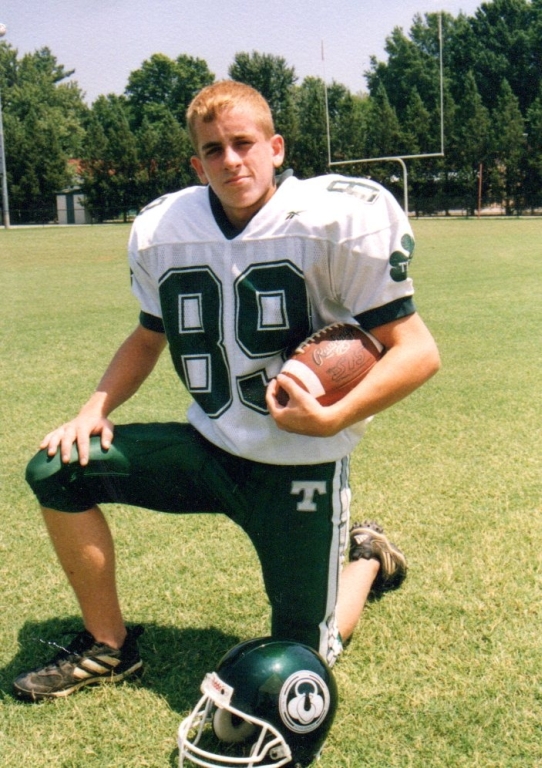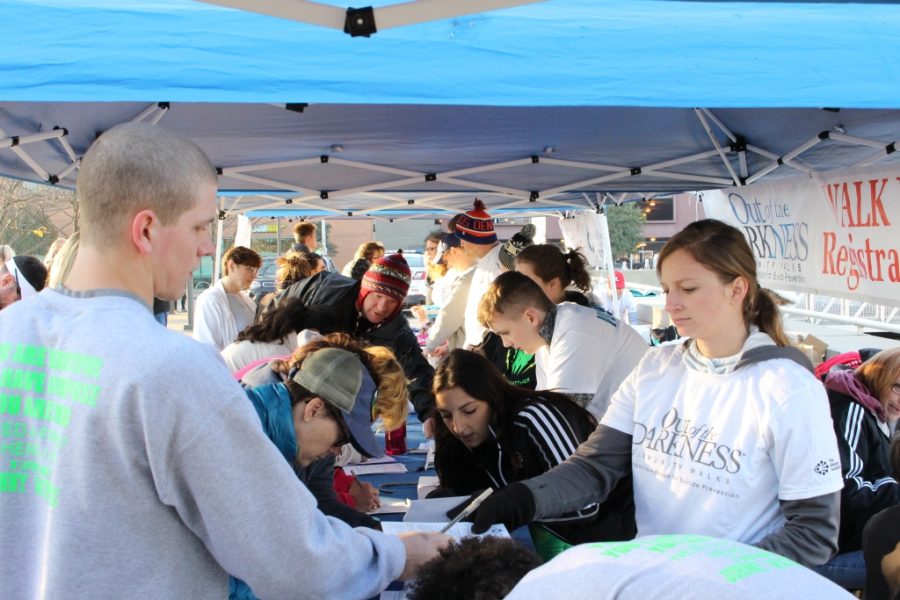Trinity Graduate’s Tragic Death Creates Hope for Others
The Out of the Darkness walk took place Nov. 5 at the Waterfront Park.
November 22, 2016
42,773. The number of people who have committed suicide in the United States in 2016, with the number still rising. There have been 727 deaths in Kentucky alone. On average, one person takes their life approximately every 12 hours in the state. It is the second-leading cause of death for ages 15-34, and the fourth-leading cause for ages 10-14. Many of these names may go unnoticed, but out of that 42,773 there is one Connor McGee.
A passionate and outgoing person, Connor was very well liked among his peers and family. His parents, Tim and Valerie McGee, described him as a free-spirited individual whom everyone loved being around.
“He was a very social person, very outgoing; he was very compassionate. He had a lot of friends,” Tim McGee said.
“Connor was very passionate, kind, thoughtful, and caring,” Valerie McGee said. “His sense of humor was one of his most endearing qualities. He had the ability to make anyone smile or laugh in any situation. There was truly never a dull moment with Connor. Everyone who met him was immediately warmed by his kind heart. He brightened the lives of everyone he met. He sensed if you were unhappy and would do anything to cheer you up. Connor never met a stranger — he greeted everyone he saw and treated them like a friend.”

Connor was born with neurofibromatosis, a rare genetic disease. The disease could cause tumors to grow anywhere in his body and cause him to have learning disabilities. Connor was fortunate to have NF1 and mild learning disabilities in the form of ADD. His parents learned after his death that his disease put him at a four-times-greater risk for suicide.
They also found out after his death that the disease could cause mental illness. Connor attended Ascension Grade School, where he played football, basketball and baseball. He then went to Trinity, where he played football, basketball, wrestling and volleyball, and graduated in 2006.
At Trinity Connor helped create the first drumline, still a popular group. He also loved guitar and taught himself to play. Connor was also a part of the ECHO newspaper while at Trinity and loved photography. But his favorite thing in the world was skiing; he was in the club at Trinity and many times went skiing on his own.
Connor went on to Murray State for three years before transferring to Indiana University Southeast to be closer to home.
Valerie McGee said, “Connor was one of a kind. His creativity was one of his greatest strengths, which fueled his passion for the arts: photography, music, playing the guitar and drums, and writing. He also loved sports, especially soccer, football, basketball, skiing.”
Amid all the happiness, however, there was a dark shadow over Connor for a couple of years.
“Looking back now, there was a series of events that happened to him — and his stressors just outweighed his coping skills,” Valerie McGee said.
Connor was assaulted in February of 2015. He reported the assault to the University of Louisville but got no help, and his attacker was never caught. Connor then injured himself and had immense back pain, which brought about emotional pain.
Problems continued in April 2015 when he got a DUI and had his license taken away. He and his girlfriend of five years had also just agreed to take a break so Connor could “get some things together” in life. He felt like he had nothing to offer her at the time.
To make matters worse, Connor began comparing his life to those of others. “He was comparing himself to where he thought he should be and where other people were at, which is an awful thing to do,” Valerie McGee said.
Despite all the problems he had experienced, his parents said, weeks before his death Connor was getting things together.
Valerie McGee said, “He was telling us about all the things he was going to do. He was lining up his life. He was going to start a full-time job. He lined up that they were going to be paying for his tuition, he and his girlfriend got some of their student loans forgiven, he was lining up his life, and he was taking care of business. We thought he was turning his life around.”
Negative thoughts, however, continued. Connor felt like a burden to some; he began to have trouble sleeping and had mood swings. Connor also began cutting himself, something no one knew.
Connor took his life in September 2015. No one saw it coming, not friends or family.
“He did a very good job at hiding his depression. I mean he was the happiest depressed person,” Valerie McGee said.
The biggest thing about suicide is that it is a permanent solution to temporary problems. Suicide is preventable, the McGees reiterated repeatedly. “Nobody should ever feel that suicide is the only way out,” Tim McGee said.
The only way to raise awareness about suicide is to talk about the issue, which many are reluctant to do. For some people, there is a strong stigma attached to suicidal individuals, labeling them as “crazy.”
The McGees have turned their son’s death into a “new passion” by helping other families and those feeling depressed all over the state. Their focus is to raise awareness of suicide, to bring it “out of darkness” so people throughout the country can understand that suicide is never the answer — that there is always another solution.
The annual Out of the Darkness walk was held Nov. 5 at Waterfront Park. It was intended to raise awareness about suicide and help prevent it. People could walk to save lives, walk to honor loved ones, and walk to raise funds. The walk offers a chance to come together and to offer compassionate healing to those devastated by the loss of a loved one.
According the McGees, “After you have someone close to you take their life, it’s like you have PTSD; it’s like a bomb went off.”
Trinity teacher and counselor Mr. Mike Magre said walks, such as Out of the Darkness, help raise awareness and really let people know they can get help. They give people a sense of advocacy. He also pointed out that we can and should spend more resources on mental health issues.
Anyone who is depressed or showing signs of suicidal actions, should seek help. They should talk to a counselor, parents, friends — anyone — about their problems. The Suicide Prevention Lifeline (1-800-273-8255) is always available.
Magre said, “We (need to) take suicide more seriously and be more aware that it is, in fact, a problem. You know our natural tendency when someone says something about killing themselves is that they can’t be serious — and that needs to change.”
Hundreds took part in the powerful Out of the Darkness walk on Nov. 5. Videos by Josh Willis




Pablo S Aguilar • Dec 22, 2016 at 2:58 pm
I am still extremely influenced by Connor McGee, and his actions have led to my success as young creative professional (These are Connor’s words: “I learned more in two hours , than a few semesters worth of college credit photo classes.” referring to a photo tour described below. (I also have a bachelor’s, from the University of Texas class of ’08 and, had nothing to show, so I got got a technical degree in Photography in 2011 out of Hallmark Institute of Photography). I saw myself going down Connor’s path in my early years, I am sad the disease made it 4times more likely for him to take his life). What a sad story, thanks for sharing, and thanks to his courageous mom and dad for sharing the story, along with his brave family and friends who have done an outstanding job remembering him and teaching us about his battles, so others can be saved.
I met Connor, August 21, 2012 (my birthday, that’s why I remember the day) in Savannah, Ga. Conor and his GF Brittany (I also remember her name because my GF’s name is Brittany) had bought a Groupon to take one of our “Photo Tours of Savannah Ga” in its first month of existence. That day, Connor’s camera decided to stop working immediately as he walked into the tour, I remember him showing a little concern in his demeanor, I sensed that and didn’t want him to miss out on his Savannah photo experience, especially since I sensed he was a true artist, and I immediately lent him my Canon 5dMark2 ($2200 dollar camera at the time, and just like the article described, connor had genuine gratefulness and left me this amazing review on TripAdvisor :
[“What an Expierence !!”
5 of 5 Stars – Reviewed September 5, 2012
So my girlfriend booked a tour for us as a birthday present , and it turned out to be one of the best gifts i have ever gotten. Much like the previous review , I had no idea what to expect for myself going into this, however , I was very pleasantly surprised. If you want to experience Savannah from a true local perspective . I greatly recommend trying this out. I learned more in two hours , than a few semesters worth of college credit photo classes. Also, i can honestly say I made new friends out of it in Pablo and Britt.
Being an aspiring photographer that I am, Savannah has been a city I’ve wanted to visit for a long time. I’ve heard so much how beautiful and historic Savannah is , so I knew i would be able to get some great photographs to document my trip. I was extremely bummed when my digital camera conveniently stopped working right before we started. However, Pablo and Britt were nice enough to let me use of theirs for the duration of the tour. Which kind of amazed me, since theirs was of superior quality and worth probably 12 of my cameras. Not only did they go out of their way by trusting me with their equipment, They met with me later and put all of the photos I took that day on a compact disc so i could have copies of them.
This is not your average run-of-the mill tourist trap, These folks are true professionals and I guarantee you will be a better photographer after this tour.!! Even in far sub optimal shooting conditions I managed to get some pretty good shots, which I displayed below.
Visited August 2012] I will send all the pictures he took that day via email to his mom and Dad.
It was reviews like his in our early days, that empowered me, gave me a purpose to live, and my company now has sat for the last 3 years in the Top 10 out of 150+ things to to in Savannah, Ga and we are growing not too fast and not too slow, we, have found stability and are able to travel.
Something clicked about him, Connor and I were EXTREMELY similar, in so many ways (his happy, positive attitude, the creative aura, the soul searching for a career, the warm heart and strong friend, the relaxed disposition, the loyalty to his loved ones, the urge to make others happy, the learning disabilities, the ADD, and the bouts with depression) I have learned to cope by centering my mind and soul and travelling the world, and my regret is that I could have done something to be an influential part of his life, like he did to me, but I should and will not have regrets, he sacrificed his life so that I can influence others in his name; I vow to never let another Connor McGee slip in front of me without at least trying to be an influence when someone least expects it or think they need it. Since he passed, I’ve had strong dreams at not going after my instinct, not reaching out and solidifying our friendship, I’ve created the scenario where a random job offering to do what he loved, might have been a spark he needed, giving him a second chance in Savannah as a photo tour guide. The dream has led me to hold off and carefully search filling our first full time position availability, because I want this job to be a blessing for someone.
A short poem:
Connor, I only met you one day,
and that one day, a multiplying day of influence,
you have led me to take life, one day
at a time when nothing else matters,
but each day of happiness.